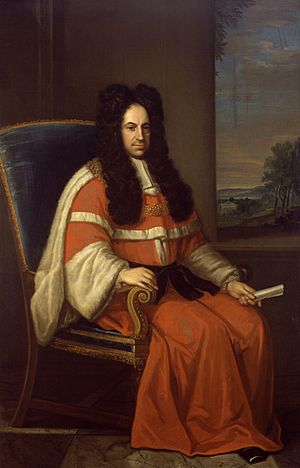Peter King, 1st Baron King facts for kids
Quick facts for kids
The Lord King
|
|
|---|---|

The 1st Lord King, by Daniel de Coning, 1720
|
|
| Lord High Chancellor of Great Britain Lord High Steward for the trials of: |
|
| In office 1 June 1725 – 29 November 1733 |
|
| Monarch | George I George II |
| Prime Minister | Sir Robert Walpole |
| Preceded by | In Commission |
| Succeeded by | The Lord Talbot |
| Chief Justice of the Common Pleas | |
| In office 1714–1725 |
|
| Preceded by | The Lord Trevor |
| Succeeded by | Sir Robert Eyre |
| Personal details | |
| Born | 1669 Exeter |
| Died | 22 July 1734 Surrey |
| Spouse | Anne Seys |
| Children | 6 |
| Alma mater | Leiden University |
Peter King, 1st Baron King (around 1669 – 22 July 1734), often called Lord King, was an important English lawyer and politician. He rose to become the Lord High Chancellor of Great Britain, which was one of the highest legal positions in the country.
Contents
Life of Peter King
Peter King was born in Exeter in 1669. He went to Exeter Grammar School when he was young.
As a young man, he was very interested in the history of the early Christian church. In 1691, he wrote a book about it called An Enquiry into the Constitution, Discipline, Unity and Worship of the Primitive Church. This book caught the attention of his cousin, John Locke, a very famous philosopher.
John Locke advised King's father to send him to Leiden University in the Netherlands. Peter King studied there for almost three years. After university, he began studying law in London in 1694. He officially became a lawyer in 1698.
In 1700, he was elected to the Parliament of England. He represented the area of Bere Alston in Devon. He held this position until 1715.
Peter King took on several important legal roles. He became the recorder (a legal officer) for Glastonbury in 1705. In 1708, he became the recorder for London. He was made a Serjeant-at-Law, which was a senior rank for barristers.
From 1714 to 1725, he served as the Chief Justice of the Common Pleas. This was a very high judge position. In 1725, he was made a Lord Justice and became the Speaker of the House of Lords. This meant he led discussions in the House of Lords.
In June of the same year, he became the Lord High Chancellor of Great Britain. He held this powerful office until 1733. He had to resign because of a serious illness that affected his movement.
He became a member of the Royal Society on 14 November 1728. The Royal Society is a famous group for scientists.
Peter King passed away at Ockham, Surrey, on 22 July 1734.
Lord King's Legal Impact
As Lord Chancellor, Peter King made some lasting changes to English law. He helped establish important rules for how property is handled after someone dies. For example, he made it clear that a will about land must follow the laws of the place where the land is located.
He also set a rule about married couples' property. If a husband wanted to claim his wife's personal money or goods through the court, the court would only help him if he agreed to set aside some of that property for his wife's use.
One of his most significant achievements was an act passed in 1730. This law made English the official language used in courts. Before this, many court documents and proceedings were in Latin. This change made the law much easier for ordinary people to understand.
Lord King's Family
Peter King married Anne Seys in 1704. They had six children together: two daughters and four sons. All four of their sons later became Lord King, Baron of Ockham after him.
After Peter King died in 1734, his wife, Lady King, lived in Grosvenor Square until she passed away in 1767.
A famous descendant of Peter King was his great-great-grandson, William King (1805–1893). In 1835, William King married Ada Byron. Ada was the only daughter of the famous poet Lord Byron. William King later became the Earl of Lovelace.
Another descendant, Peter John Locke King, was a Member of Parliament for Surrey. He was known for trying to change old laws. He helped pass a law about real estate in 1854 and helped get rid of many outdated laws.
Lord King's Published Works
Lord King wrote several books during his lifetime. In 1702, he published a book called History of the Apostles' Creed. This book was very popular and was printed many times. It was even translated into Latin.
His earlier work, An Enquiry into the Constitution, Discipline, Unity and Worship of the Primitive Church, was published in 1691. This book was important to John Wesley, a famous religious leader. Wesley often quoted King's book in his letters and it influenced his ideas about the church.
Images for kids


